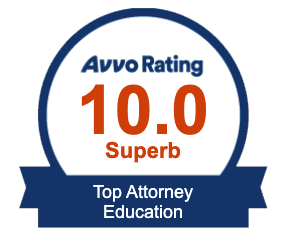In Georgia, many school systems conduct annual Individualized Educational Program (IEP) meetings during April and May. The purpose of conducting an annual IEP meeting is to review the prior IEP and make any revisions, changes, amendments etc that are necessary so that the student begins the new school year with a hopefully improved IEP. It is problematic to give any specific advice about what you can do at an annual IEP meeting because so much depends upon the individual circumstances of each child. Suffice it to say, however, that there are some general things you can do to prepare for the annual IEP meeting that may be helpful.
First, it is important that parents ask questions concerning their child’s current educational performance. How has the school system’s assessed your child within the past school year? Standardized assessments, criterion referenced-tests, grades, informal observations, and data collection? The more objective information you have about your child’s past educational performance and how it was measured, the more likely you will be able to draft appropriate goals and objectives for the next school year. Goals and objectives should always be measurable. They should be worded in a positive manner such as the student will increase his social skills by initiating contact with peers 8 out of 10 times. You should question any goal or objective that is framed in the negative. For instance, the child should stop getting out of his chair during class 8 out 10 times. This goal or objective does not teach the child to stop getting out of his chair during class. You want your child to learn appropriate behavior to stop getting out of his chair. You should also consider having objectives achieved by objective criterion (e.g. standardized tests, formal assessment, data) as much as reasonably possible. The more subjectively that is contained in the assessment of an IEP goal or objective, the more likely that a teacher will say yoru child has made progress on the goal or objective. It comes to no surprise that most teachers want to show parents that their child has benefited by their instruction and classroom. Last, the discussion of goals and objectives should occur in the context of what will be the child’s educational placement for the next school year. For example, if the goals and objectives can be achieved in a regular classroom, co-taught classroom, or with the assistance of an itinerant special education teacher or paraprofessional, then yoru child’s placement should be in these type of classroom settings. You want to strive, if possible, so that your child can be taught both academics and other subjects in the regular classroom to the maximum extent possible. This is what inclusion is all about, right? This is not to say that every child with a disability must be fully included in regular classes all school day. There are circumstances where resource classroom may be necessary. In limited circumstances, your child may require a small classroom for certain type of instruction such as for Applied Behavior Analysis (ABA) or Wilson Reading Program. You would not want your child to be a regular classroom with a large number of students if it is educationally necessary to teach your child – using a specific methodology such as ABA – to remain in a small group setting or even 1:1, 1:2 or 1:3 teacher to student ratio.r
Another area of concern during annual IEP meetings is extended school year programming. Again, this is a difficult area to generalize and provide helpful advice. You should secure a copy of the school system’s criteria for extended school year programming before the annual IEP meeting. At the IEP meeting, ask if the school has collected data to determine if your child has regressed during extended absences from school because of holidays and vacations. You should point out if your child regresses educationally during long periods of absence from school. These are only two criteria to consider. There are several other criteria that the IEP committee should consider before determining whether your child should receive extended school year programming.
If you have specific questions about the annual IEP meeting, then feel free to post and blog. We can all learn from other’s experiences.

